
Early, Real-World Results from WP Engine’s 40% Faster Platform
On the heels of last week’s announcement that WP Engine became the first WordPress Digital Experience Platform (DXP) to offer Next Generation hardware from Google Cloud Platform, we wanted to showcase some early, real-world results from customer sites that are already seeing massive performance improvements after migrating to this new infrastructure.
As a refresher, Google’s new compute-optimized VMs (C2) offer high per-thread performance and memory speeds that can provide a 40% improvement in performance. The major difference is that the C2 instances run at 3.8 GHz instead of 2.2 or 2.8 GHz, allowing PHP and MySQL execution to happen at that 40% faster rate.
Typically, when a new customer moves to the WP Engine DXP from other platforms, they see an increase in performance. Now, when you combine Google’s Next-Gen Hardware with WP Engine’s existing high-performance platform, customers’ web pages are loading even faster, providing a superior overall experience. As we’ve begun rolling out Next Generation hardware to our customers, the results, which we have great visibility into thanks to New Relic, simply speak for themselves.
BoardingArea.com, a popular business travel website, experienced far more than a 40% drop in its server execution time, seen across the multiple web properties it migrated over to the new hardware. Here are results from just a couple of the sites they migrated over last week:
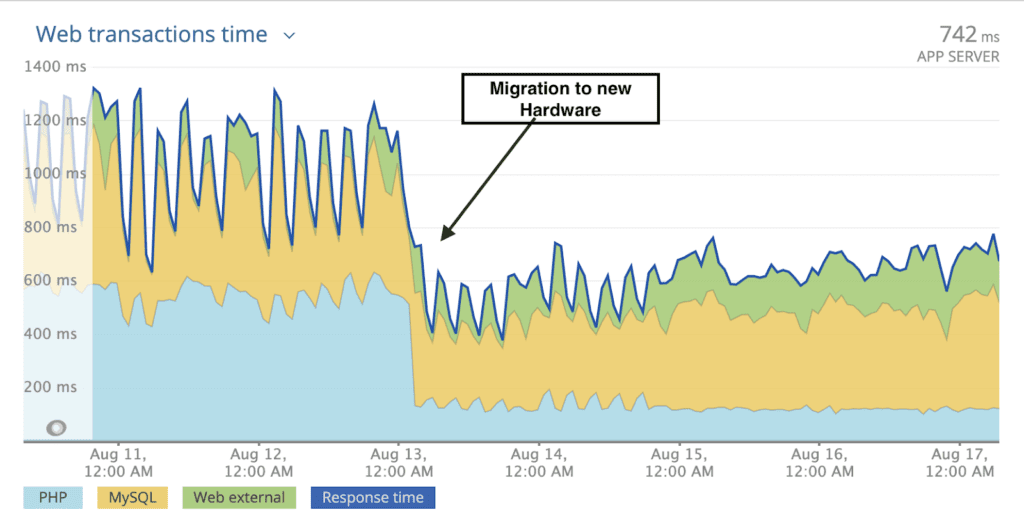
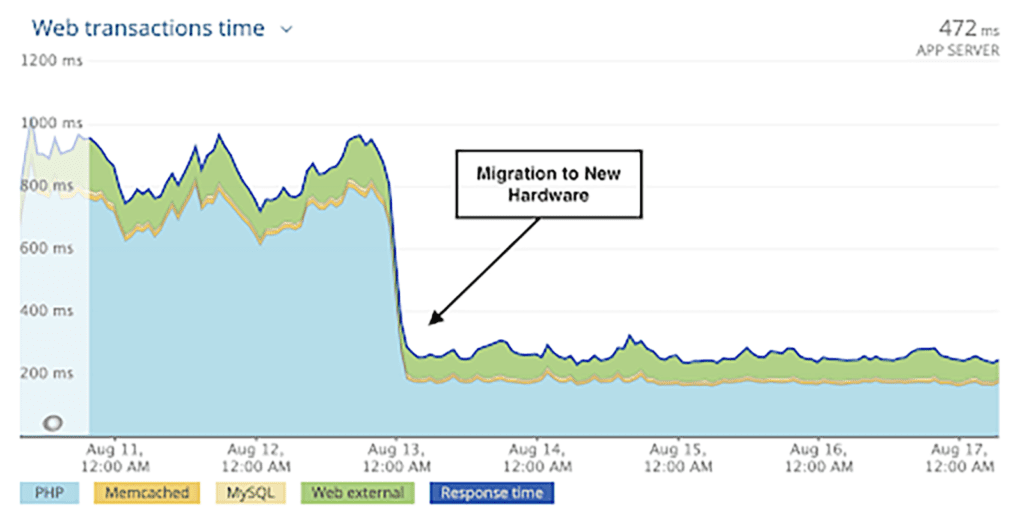
As you can see, server execution improved significantly across the board as soon as the migration was complete, giving BoardingArea a massive performance boost that translated into faster page speeds and better end-user experience.
“When our account team at WP Engine told us we’d see up to a 40% increase in performance by switching to the C2 VMs on Google Cloud, we were excited to see the results,” said Denny Butts, Director of Project Engagement, at Frequent Flyer Services.
“Once we were switched over to the new VMs, which was quick and seamless, we actually saw a 69% increase in performance. We were blown away. In addition to the immediate improvements in speed and performance we’re seeing across our sites, we also feel like we now have cutting-edge infrastructure in place that future-proofs our sites, and gives us a really solid foundation to keep building our business.”
Beyond BoardingArea, other early Next Gen adopters have also been thrilled with the immediate improvements they’ve experienced across their web properties.
A popular news website, which also migrated to the new Next Gen VMs last week, saw an immediate drop in backend processing times:
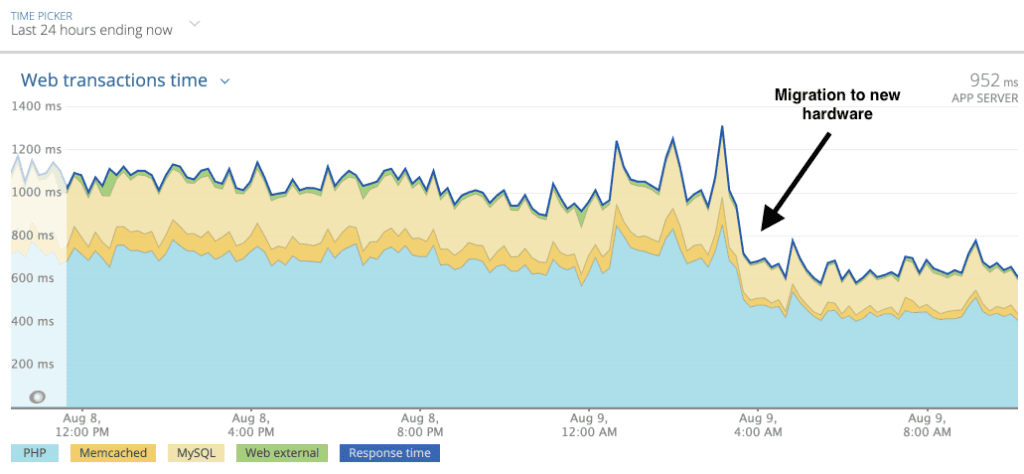
This customer was previously operating at a peak response time of ~1300 milliseconds and immediately dropped to ~700 milliseconds (~46% improvement) post-migration. Additional metrics tracked in the above chart (PHP, Memcached, MySQL, etc.) all saw similar improvement in response time.
A high-traffic retail eCommerce site was able to remedy the spikes in response time it was experiencing before migrating to the new Next Gen VMs:

While the response time on this site was previously peaking at ~3500 milliseconds, it dropped to ~2000 post-migration, with those times decreasing and stabilizing even further the following day.
Finally, a professional services resource site with more than 9 million visits per month, was able to significantly decrease its already low response times by ~50%. While the customer was experiencing a peak response time of ~250 milliseconds, they were able to realize ongoing response times of ~50 milliseconds from the ~100 milliseconds experienced prior to the migration:
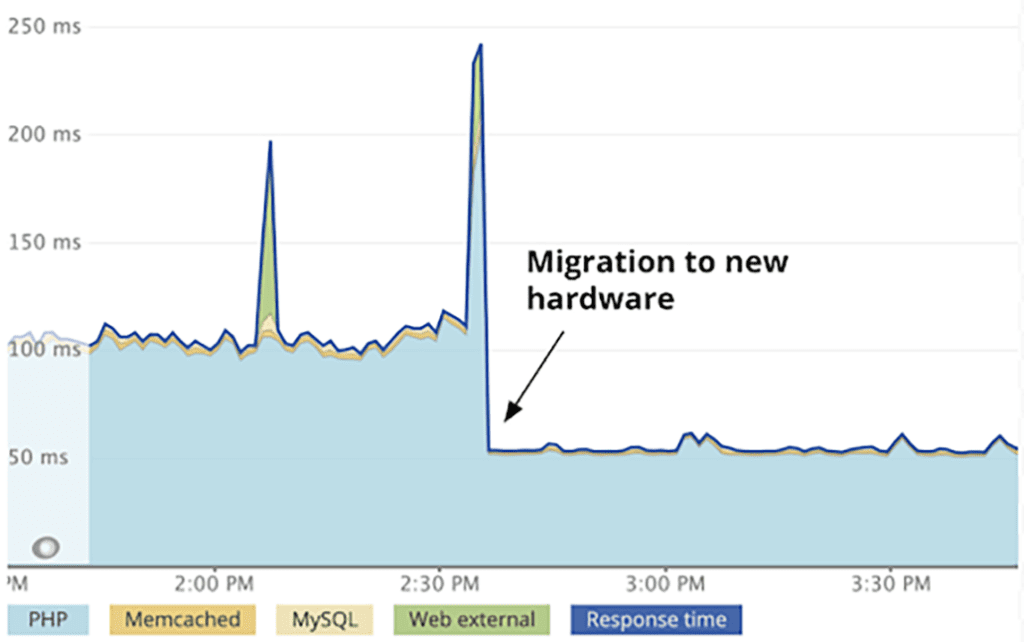
The above are just a handful of WP Engine customers already experiencing massive performance improvements from the early adoption of Google’s Next Gen Hardware —we’ve seen similar results across other WP Engine Premium customer sites who have made the leap.
As more customers are migrated over to this new infrastructure, we’ll continue to share results and more detailed case studies that provide additional information on the migration process, from start to finish. We’ll also continue with the ongoing performance, maintenance, and monitoring we do every day, which makes WP Engine the unequivocal leader in WordPress performance.
As a reminder, the new Next Gen VMs are available to all of our Premium Plan customers at no extra charge. As of now, this next-generation architecture is currently available in our Central North American datacenter. We will make this compute-optimized architecture standard in all WP Engine Premium plans in alignment with Google’s rollout schedule.
Customers interested in adopting this architecture can email [email protected] or call 1-877-973-6446.









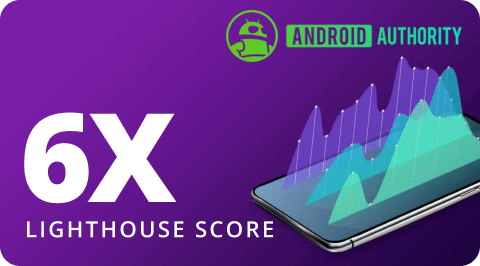

So did Google VMs or WP Engine get faster?
It seems like upgrading to C2 instances in general would make any workload faster regardless of what managed host you are on.
To answer your first question, both. Google got faster because of the move to C2 and then we got faster thanks to that as well as certain software optimizations we’ve made recently to the platform.
On the second question – yes. An upgrade to the C2 infrastructure will improve the performance of your site, regardless of your host. However, WP Engine is the first and only WordPress Digital Experience Platform to offer this new infrastructure to its customers. Google was quoted in our C2 announcement and we were quoted in theirs.